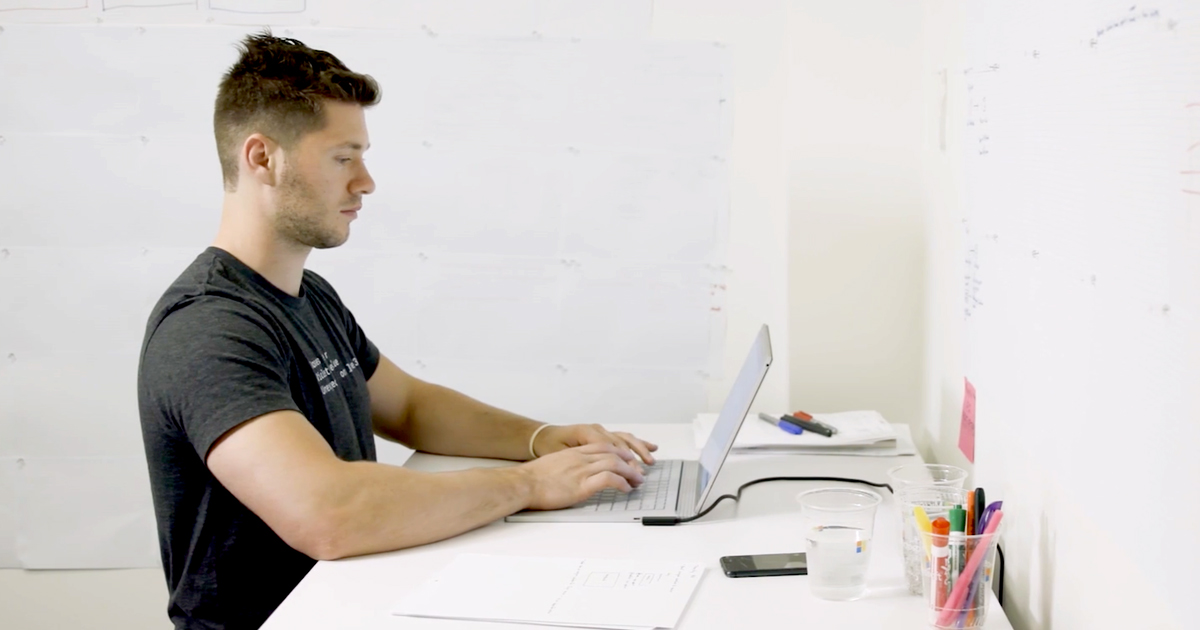The Corporate Entrepreneur: Matthew Mottola at Microsoft

Matthew Mottola MS’17 began chasing a problem in 2013. Why do so many people hate work, and why does it have such a negative stigma? He became obsessed with this problem, and worked relentlessly until he found a solution.
Freelancing First
Mottola began what he would later realize was freelancing when he was just a freshman in college. “I would make business plans for people, financial models,” he said. “It paid me better than an ice cream shop.” Mottola was a one-man consulting firm, and he loved it.
He thought of this work as an extension of how he could help people, and then realized that what he was really doing was starting his own freelance business. This work helped pay for college, and it’s what brought him to Babson for graduate school.
Mottola wanted a program that would allow him to focus on building his business. Babson’s Master of Science in Entrepreneurial Leadership (MSEL) was the perfect fit.
“I chose Babson instead of going to an accelerator,” Mottola said. He knew he wanted to be an entrepreneur, and Babson was the place he wanted to be.
LEAP into Business
All MSEL students take a required experiential course called the Learning Entrepreneurial Action Project (LEAP). Mottola used LEAP as an opportunity to launch the business idea he’d been hatching—a platform connecting student freelancers to businesses through project-based work.
By translating his freelance experience to this platform, Mottola believed he could help accelerate student careers. The platform provided every student with the opportunity to gain real-world skills, learn what they wanted to do after graduation, and have tangible experiences to put on their résumés.
“Freelancing was the reason I got into Babson. I showed up with a portfolio of my freelance projects, along with a rough sketch of the business I wanted to create, and fortunately they let me in,” said Mottola. “I truly believe Babson wouldn’t have accepted me without this experience. I wanted my platform to translate the opportunity freelance gave me and make it accessible for other students and whatever they were shooting for.”
Over the course of his program, Mottola dedicated all his time to building out the platform. “At Babson, I learned to identify a problem and find the cheapest and quickest way to make it possible.” He utilized his professors, peers, and Babson’s many resources to build his solution.
Approaching graduation with a dwindling bank account and uncertainty in his future, Mottola realized he might not be the right person to accomplish his original goal of making work better. “Babson was phenomenal at giving me the framework to question, ‘Why me?’” Why was he the right person to build this platform and solve this problem?
At this point in time—he wasn’t. Mottola knew he lacked the technical skills to bring his idea forward. He pivoted to his next opportunity—a job in San Francisco at Gigster, the direct competitor for the platform he was building.
Power of the Pivot
Mottola started in Gigster’s lowest possible sales role, giving him a golden opportunity to hear customer pain points. “I would have taken a job as the office manager, because I just wanted to talk to customers,” he said. Even though he was at Gigster full time, Mottola hadn’t abandoned his platform. He used Gigster customer insights and feedback to improve his solution, with the ultimate goal to make freelance mainstream.
After nine months working for Gigster, Microsoft approached Mottola to bring his work with freelancers to their corporate setting.
At first he was hesitant. “I was afraid of losing my entrepreneurial roots,” said Mottola. “I loved Silicon Valley. It felt like a giant Babson, where everyone tries to change the world. I was scared of leaving that environment.”
But, after meeting the Microsoft team, seeing the changes CEO Satya Nadella has driven within the company, and reflecting on Microsoft’s potential in the freelance space, Mottola realized this was an ideal next step in his journey.
“In this industry, there is a supply and demand problem—a bunch of freelancers that love their work, and enterprises that want to engage freelance. The foundation to connect these two at an enterprise level was missing. It hit me that Microsoft was the leading player to solve for this.”
The first thing Mottola did at Microsoft was turn all of the walls in his office into customer journey maps—a design thinking tool he took away from Babson. This allowed him to see the pain points and prioritize what features were most important to customers when launching and scaling freelance programs. From these features, he spearheaded a cross-functional team to develop the Microsoft 365 Freelance Toolkit—curated tools, templates, and best practices for enterprises to launch and scale freelance programs.
“Everything required to launch this product was a reflection of Entrepreneurial Thought & Action®,” said Mottola. “From the leadership skills I used to work with all different types of people, to the agile frameworks to identify real problems and drive solutions, I owe it all to Babson.”
Mottola took his entrepreneurial mindset and used it to spark change in one of the largest companies in the world. He used his Babson education to innovate from within—and finally solved the problem he’d chased throughout his career.
Posted in Entrepreneurial Leadership





